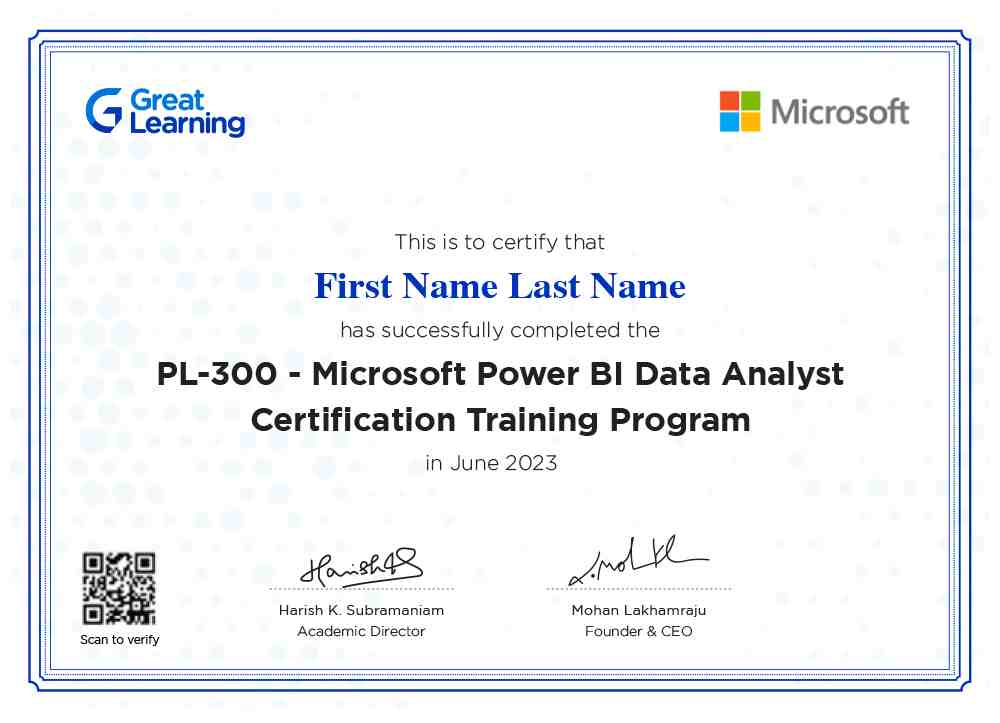Download Brochure
Check out the program and fee details in our brochure
Thanks for your interest!
An advisor will be reaching out to you soon.
Not able to view the brochure?
View BrochureGet details on syllabus, projects, tools, and more

With PL-300 - Microsoft Power BI Data Analyst Certification Training Program
Application closes 26th Feb 2026
12-Week Online Program
4 Hands-on Projects
Dedicated Program Manager
Certificate of Completion from Great Learning and Microsoft
PL-300 - Microsoft Power BI Data Analyst Certification Training Program
The Data Analytics and Power BI Bootcamp is designed to empower tech professionals with critical business intelligence skills needed to break into and grow in the analytics world. The program helps you master foundational skills in Power BI and Data Analytics with a well-rounded curriculum, weekly personalized mentorship sessions, hands-on projects, and case studies. It also equips you with the skills needed to crack the PL-300 - Microsoft Power BI Data Analyst Certification that sets you apart from other tech professionals in the talent pool. At the end of this program, you will have developed skills that demonstrate your industry readiness to employers and earned a certificate of completion from Microsoft and Great Learning.
Read more



Prepare for PL-300 Certification Exam with:
Live Virtual Classes with Microsoft Certified Instructors
Hands-on Learning and Academic Support
Exam Preparation Guide
Hands-on Projects
Course 1: DATA ANALYTICS FOUNDATIONS
In the first week, students will delve into the Analytics Lifecycle, covering data sources, pipelines, insight generation, and hands-on activities like Excel analytics and charts.
Week 1: Analytics Lifecycle - An End-to-End Case Study
In the first week of the program, students will gain a comprehensive understanding of the Analytics Lifecycle, including the exploration of diverse data sources and databases. They will learn to navigate a typical data pipeline, generate valuable insights, and make recommendations based on end-to-end business case study demonstrations.
Week 2: Generating Insights using Excel
Practical skills will be honed through sessions, delving into Excel, working with Pivot Tables, sorting and filtering data, utilizing the Analyze Tab, exploring charts, and mastering descriptive statistics.
Course 2: SQL FOR DATA ANALYTICS
Moving on to the next two weeks, students will explore the essentials of databases and SQL fundamentals. They will also master the art of data manipulation and analysis through various topics.
Week 3: Introduction to Databases and the Fundamentals of SQL
In this week, students will delve into the foundations of databases and gain a solid understanding of the SQL language. The week covers introductory concepts of relational databases, basic SQL syntax, and statements including SELECT, FROM, and WHERE. Students will learn the art of retrieving data using SELECT, explore SQL operators, and discover the power of in-built functions for numerical, string, and date-time manipulations. They will also learn essential skills such as filtering data using the WHERE clause, pattern matching with LIKE and wildcards, sorting query results, aliasing, and executing pagination queries.
Week 4: Data Manipulation and Analysis
This week, students will advance their skills in data manipulation and analysis. Beginning with the foundational concepts of aggregating and grouping data, the week extends to techniques such as aggregation-based filtering using HAVING, understanding SQL constraints, mapping, and joining tables. Students will explore the power of UNION and UNION ALL operations for combining datasets, delve into window functions for ranking, partitioning, and aggregating data, and master the intricacies of subqueries and nested subqueries. The week also covers the practical application of Common Table Expression (CTE) for query simplification and imparts an understanding of the crucial order of execution.
Course 3: PYTHON FOR DATA ANALYTICS
Heading on to the next few weeks, students will set up Google Colab and delve into fundamental concepts like variables, data types, and data structures. Weeks 5 and 6 focus on practical data transformation using Numpy and Pandas.
Week 5:Introduction to Python Programming
Students will start this week by configuring Google Colab and then delving into the fundamentals of Python. Covering variables, data types, and data structures, this week lays a solid foundation for understanding and applying essential concepts in Python programming.
Week 6:Data Transformation Using Numpy and Pandas
This week, students dive into Numpy arrays and functions, mastering techniques such as indexing and accessing data. The week progresses to Pandas, covering series, dataframes, and essential operations like saving, loading, merging dataframes, and utilizing Pandas functions for comprehensive data manipulation and transformation.
Week 7: Exploratory Data Analysis
This week, students gain expertise in data exploration through sanity checks, univariate, and bivariate analysis. The week also covers critical tasks such as missing value treatment and outlier detection, providing a holistic approach to uncovering insights and ensuring data integrity in the analysis process.
Week 8: LEARNING BREAK
Course 4: PL-300 - POWER BI DATA ANALYST CERTIFICATION TRAINING PROGRAM
In the Power BI Data Analyst Certification Training Program, students cover data manipulation, visualization, DAX language, and report production. It also includes hands-on experience with Power BI features. Students learn best practices for creating effective visualizations, deploying reports, and managing security and administration within Power BI.
Week 9: Working with Data in Power BI
This week, students gain proficiency in Power BI essentials. Covering the interface, data visualization, and report creation, the week includes connecting to diverse data sources, basic data modeling, data preparation, cleaning, transformation using Power Query, establishing relationships between data tables, and exploring advanced modeling techniques for a comprehensive understanding of Power BI capabilities.
Week 10: Creating Effective Visualizations
This week covers best practices for compelling visuals, customizing with formatting options, dashboard creation, and utilizing Power BI Developer Tools for custom visuals. The week also explores incorporating R and Python for advanced analytics and building interactive, drill-down visualizations to enhance the overall data storytelling experience.
Week 11: DAX Basics and Advanced DAX
Students get introduced to the Data Analysis Expressions (DAX) language. The week covers creating calculated columns and measures using DAX functions, understanding context in DAX calculations, leveraging advanced DAX functions for time intelligence, ranking, and more. Students explore working with tables and filters in DAX expressions and optimizing DAX performance.
Week 12: Productionizing Power BI Reports
This week, students learn the practical aspects of deploying and sharing Power BI reports. This includes deploying reports and dashboards to the Power BI Service, sharing with users and groups, and utilizing collaboration features. Students will learn how to implement best practices for optimized data models, understand query folding, and optimize queries for performance. The week also covers the use of DirectQuery and Live Connection for handling large datasets efficiently.
Week 13: Power BI Administration and Security
In the 'Power BI Administration and Security' module, participants gain expertise in managing Power BI workspaces, reports, and data sources. The curriculum covers configuring security settings, permissions, and delves into utilizing the Power BI API for automation and integration, empowering participants with skills for effective administration and robust security practices in Power BI.

* Image for illustration only. Certificate subject to change.
For any feedback & queries regarding the program, please reach out to us at dav.ms@mygreatlearning.com
Become a data analyst
Power BI
Python
SQL
Excel
NumPy
Pandas
Gain Insights into Recruiter Expectations.
Showcase Your Strengths Impressively
Create a Professional Portfolio Demonstrating Skills and Expertise
Our admissions close once the requisite number of participants enroll for the upcoming batch . Apply early to secure your seats.

Apply by filling a simple online application form.

Go through a screening call with the Admission Director’s office.

Selected candidates will receive an offer letter. Secure your seat by paying the admission fee.